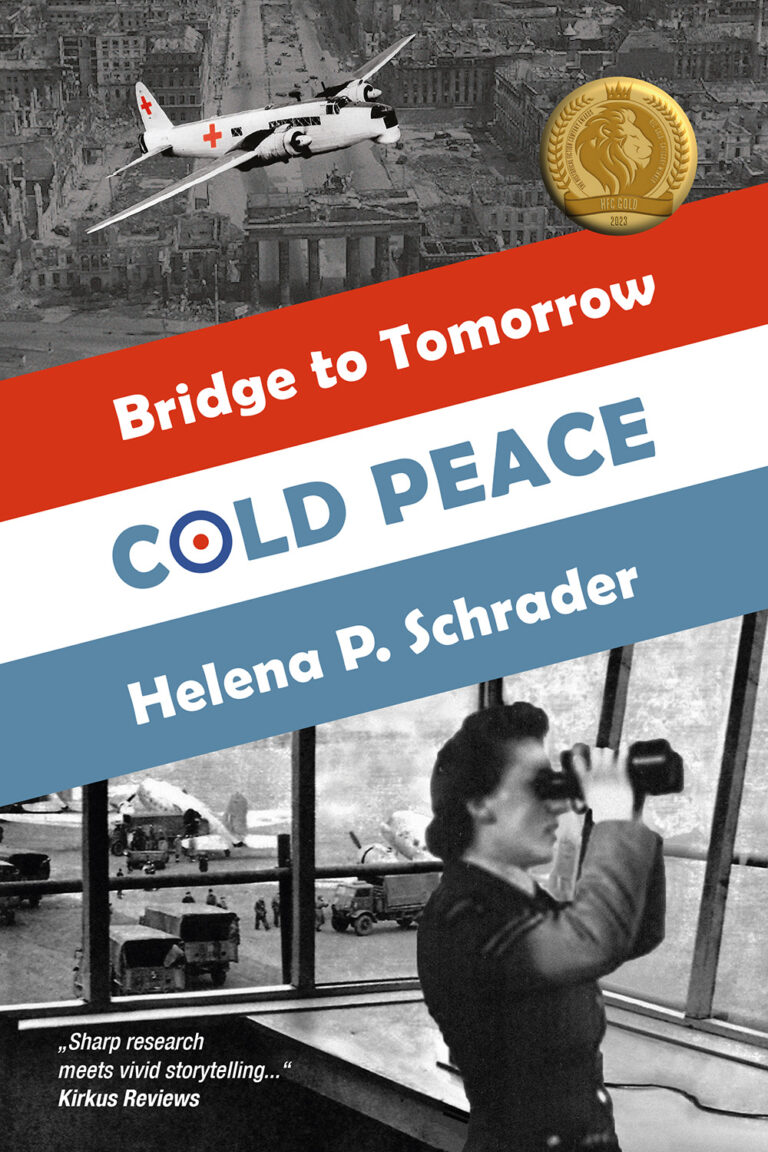COLD PEACE is the first installment in Helena P. Schrader’s Bridge to Tomorrow trilogy, the author’s “novel of the Berlin Airlift in three parts.” This fascinating book brings to life one of the first international crises of the Cold War.
Relations between the various nations present in Berlin in 1948 became so fraught that the Soviet Union blockaded the Western Allies from parts of the city, closing roads, rails, and even the canals to prevent passengers and goods from being brought in. In response, American and British air forces mobilized to fly over the city, dropping fuel and food to the inhabitants with more than 250,000 flights over the year-long blockade. This “Berlin Airlift” supplied more than two million inhabitants with crucial supplies by air alone. It was the first Western victory in the Cold War, and an astonishing example of successful non-violent response to political aggression.
Schrader uses her keen storytelling skills and thorough knowledge of the time period to recreate this incredible story for a modern audience. Her novel, set largely in Berlin shortly before the blockade and at its very beginning, paints a picture of a dire post-war landscape. The city Hitler once conceived of as the capital of his new world is in ruins, and the economy there so broken that worthless traditional currency has been replaced with the trading of American cigarettes.
The author has clearly undertaken painstaking and extensive research: this historical context informs everything within the book, from the narrative to the descriptions of place and character. She weaves significant levels of detail—from the minutiae of everyday domestic life to powerful political drama—into her story to conjure a real sense of time and place. In doing so, Schrader describes a wide scope of human experience. We witness one poverty-stricken character shivering in her coat in her frozen flat as she tries to work out how to feed herself with meagre rations. In another scene, in the moments before a crucial City Council vote, a “spontaneous” political demonstration turns violent as rioters flood the Berlin Town Hall.
This is a tightly plotted, fast-paced novel that boasts a cast of well fleshed-out characters with unique identities and compelling backstories. There are multiple narratives playing out across the continent, interlinking the human stories of war heroes and conflict survivors. The reader quickly grows to care about Schrader’s characters: Charlotte, the German Countess turned impoverished journalist; Wing Commander Robin Priestman and his wife and fellow pilot Emily; new-to-Berlin RAF air traffic controller Kathleen Hart and her little daughter Hope; and David Goldman, a bereaved son making his mark on a new world and reclaiming his right to family property stolen by Nazis.
Cataclysmic political storm clouds may be brewing across the city in COLD PEACE, but it is Schrader’s painting of human stories that really creates the sense of drama that grips the reader. This is one for fans of military fiction, realistic suspense, and high-octane historical drama.
The first in Helena P. Schrader’s trilogy that retells the dramatic story of the Berlin Airlift, COLD PEACE draws the reader in with the author’s rich cast of characters, engrossing human drama, and impressive historical research.
~Emily Jessica Turner for IndieReader


